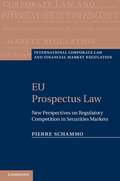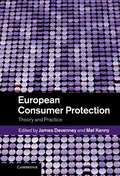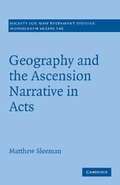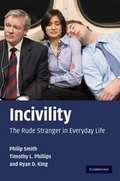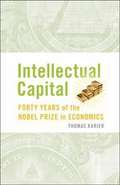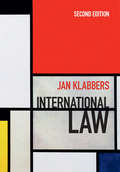- Table View
- List View
Effective Treatments in Psychiatry
by Peter Tyrer Kenneth R. SilkTyrer (community psychiatry, Centre for Mental Health Imperial College, London, UK) et al. present this pocket (7x5") reference to effective psychiatric treatments. Covering a full range of disorders from schizophrenia and substance abuse disorders to anxiety and sexual identity disorders, this pocket reference provides brief information on each disorder as well as effective treatments. Drawing from the most recent psychiatric consensus, the material will be highly useful as an and up-to-date treatment reference for both psychiatry students and practitioners. Annotation ©2012 Book News, Inc. , Portland, OR (booknews. com)
Ellipsis in English Literature
by Anne TonerAnne Toner provides an original account of the history of ellipsis marks - dots, dashes and asterisks - in English literary writing. Highlighting ever-renewing interest in these forms of non-completion in literature, Toner demonstrates how writers have striven to get closer to the hesitancies and interruptions of spoken language, the indeterminacies of thought, and the successive or fragmented nature of experience by means of these textual symbols. While such punctuation marks may seem routine today, this book describes their emergence in early modern drama and examines the relationship between authors, printers and grammarians in advancing or obstructing the standardisation of the marks. Their development is explored through close study of the works of major English writers, including Jonson, Shakespeare, Richardson, Sterne, Meredith and Woolf, along with visual illustrations of their usage. In particular, Toner traces the evolution of ellipsis marks in the novel, a form highly receptive to elliptical punctuation.
Encyclopaedism from Antiquity to the Renaissance
by Jason König Greg WoolfThere is a rich body of encyclopaedic writing which survives from the two millennia before the Enlightenment. This book sheds new light on that material. It traces the development of traditions of knowledge ordering which stretched back to Pliny and Varro and others in the classical world. It works with a broad concept of encyclopaedism, resisting the idea that there was any clear pre-modern genre of the 'encyclopaedia', and showing instead how the rhetoric and techniques of comprehensive compilation left their mark on a surprising range of texts. In the process it draws attention to both remarkable similarities and striking differences between conventions of encyclopaedic compilation in different periods, with a focus primarily on European/Mediterranean culture. The book covers classical, medieval (including Byzantine and Arabic) and Renaissance culture in turn, and combines chapters which survey whole periods with others focused closely on individual texts as case studies.
The Essential Guide to Effect Sizes: Statistical Power, Meta-analysis, and the Interpretation of Research Results
by Paul D. EllisThis succinct and jargon-free introduction to effect sizes gives students and researchers the tools they need to interpret the practical significance of their results. Using a class-tested approach that includes numerous examples and step-by-step exercises, it introduces and explains three of the most important issues relating to the practical significance of research results: the reporting and interpretation of effect sizes (Part I), the analysis of statistical power (Part II), and the meta-analytic pooling of effect size estimates drawn from different studies (Part III). The book concludes with a handy list of recommendations for those actively engaged in or currently preparing research projects.
EU Prospectus Law
by Pierre SchammoPierre Schammo provides a detailed analysis of EU prospectus law (and the 2010 amendments to the Prospectus Directive) and assesses the new rules governing the European Securities and Markets Authority, including the case law on the delegation of powers to regulatory agencies. In a departure from previous work on securities regulation, the focus is on EU decision-making in the securities field. He examines the EU's approach to prospectus disclosure enforcement and its implementation at Member State level and breaks new ground on regulatory competition in the securities field by providing a 'law-in-context' analysis of the negotiations of the Prospectus Directive.
European Consumer Protection
by James Devenney Mel Kenny"This volume analyses the theory and practice of European consumer protection in the context of consolidation initiatives seen, inter alia, in the revision of the Consumer Acquis, the Draft Common Frame of Reference and the proposal for an EU Consumer Rights Directive. The issues addressed are all the more significant given the revisions to the proposed Directive, the appointment of an 'Expert Group on a Common Frame of Reference' and the Commission's 2010 Green Paper on progress towards a European Contract Law. The contributions to this volume point to the arrival of a contested moment in EU consumer protection, questioning the arrival of the 'empowered' consumer and uncovering the fault lines between consumer protection and other goals. What emerges is a model of poly-contextual EU consumer protection law, a model that challenges the assumptions in both the 2010 Green Paper and the revised proposed Consumer Rights Directive"--
Field Research in Political Science
by Diana Kapiszewski Lauren M. MacLean Benjamin L. Read Diana Kapiszewski Lauren M. MacleanField research - leaving one's home institution in order to acquire data, information or insights that significantly inform one's research - remains indispensable, even in a digitally networked era. This book, the first of its kind in political science, reconsiders the design and execution of field research and explores its role in producing knowledge. First, it offers an empirical overview of fieldwork in the discipline based on a large-scale survey and extensive interviews. Good fieldwork takes diverse forms yet follows a set of common practices and principles. Second, the book demonstrates the analytic benefits of fieldwork, showing how it contributes to our understanding of politics. Finally, it provides intellectual and practical guidance, with chapters on preparing for field research, operating in the field and making analytic progress while collecting data, and on data collection techniques including archival research, interviewing, ethnography and participant observation, surveys, and field experiments.
The Fundamentals of Political Science Research
by Paul M. Kellstedt Guy D. WhittenPaul M. Kellstedt's and Guy D. Whitten's The Fundamentals of Political Science Research provides an introduction to the scientific study of politics, supplying students with the basic tools needed to be both critical consumers and producers of scholarly research in political science. The book begins with a discussion of what it means to take a scientific approach to the study of politics. At the core of such an approach is the development of causal theories. Because there is no magic formula by which theories are developed, the authors present a series of strategies and develop an integrated approach to research design and empirical analyses that allows students to determine the plausibility of their causal theories. The text's accessible presentation of mathematical concepts and regression models with two or more independent variables is a key component to this process, along with the integration of examples from political science and the real world to help students grasp the fundamental concepts.
The Fundamentals of Political Science Research
by Paul M. Kellstedt Guy D. WhittenReligious ideas and actors have shaped Asian cultural practices for millennia and have played a decisive role in charting the course of its history. In this engaging and informative book, Thomas David DuBois sets out to explain how religion has influenced the political, social, and economic transformation of Asia from the fourteenth century to the present. Crossing a broad terrain from Tokyo to Tibet, the book highlights long-term trends and key moments, such as the expulsion of Catholic missionaries from Japan, or the Taiping Rebellion in China, when religion dramatically transformed the political fate of a nation. Contemporary chapters reflect on the wartime deification of the Japanese emperor, Marxism as religion, the persecution of the Dalai Lama, and the fate of Asian religion in a globalized world.
Funding your Career in Science
by Ritsert C. JansenDreaming of a successful future in science? This practical guide for students, postdocs and professors offers a unique step-by-step approach to help you get the funding to start or consolidate your own research career. From preparing and writing effective career grant applications, to understanding how funding agencies will evaluate them, it provides guidance to enhance your skills and combine them with those of others who can support you on the road to success. Learn how to generate great original ideas for your application, strategically prepare and optimise your plan and rsum, develop a convincing title and abstract, convert reviewers' comments to your advantage, and succeed at a selection interview. With numerous valuable tips, real-life stories and novel practical exercises, this must-read guide provides everything you need to optimise your funding opportunities and take responsibility for your own career in science.
Geography and the Ascension Narrative in Acts
by Matthew SleemanThe book of Acts contains a strong geographical component. Yet readings of Acts typically ignore or marginalise geography's contribution to the construction of the narrative's theology. In this book Matthew Sleeman argues that Jesus' ascension into heaven is foundational for establishing the 'spatiality' of Acts, showing that the narrative's understanding of place and space is shaped decisively by Christ's heavenly location. Drawing on recent advances in geographical theory, Sleeman offers a 'spatial' interpretation that expands our vision of how space and place inform the theological impulses of Acts. Presenting a complement to conventional 'temporal' readings of Acts, he sheds new light on the theology of the book, and suggests new ways of reading not only Acts but also other New Testament texts. Sleeman's work combines innovative biblical scholarship with accessible and informative geographical analysis, and is suitable for those with research and teaching interests in human geography or biblical studies.
Governing Digitally Integrated Genetic Resources, Data, and Literature
by Reichman, Jerome H. and Uhlir, Paul F. and Dedeurwaerdere, Tom Jerome H. Reichman Paul F. Uhlir Tom DedeurwaerdereThe free exchange of microbial genetic information is an established public good, facilitating research on medicines, agriculture, and climate change. However, over the past quarter-century, access to genetic resources has been hindered by intellectual property claims from developed countries under the World Trade Organization's TRIPS Agreement (1994) and by claims of sovereign rights from developing countries under the Convention on Biological Diversity (CBD) (1992). In this volume, the authors examine the scientific community's responses to these obstacles and advise policymakers on how to harness provisions of the Nagoya Protocol (2010) that allow multilateral measures to support research. By pooling microbial materials, data, and literature in a carefully designed transnational e-infrastructure, the scientific community can facilitate access to essential research assets while simultaneously reinforcing the open access movement. The original empirical surveys of responses to the CBD included here provide a valuable addition to the literature on governing scientific knowledge commons.
Handbook of Drugs in Intensive Care
by Henry G W Paw Rob ShulmanA thoroughly updated edition of this well-established guide to drugs and prescribing for intensive care. The book is split into two sections: an A-Z guide to the drugs available, and concise notes on the key topics and situations faced on a daily basis. T
Hellenistic and Biblical Greek
by B. H. McleanThis Hellenistic Greek reader is designed for students who have completed one or more years of Greek and wish to improve their reading ability and gain a better appreciation for the diversity of the language. The seventy passages in this reader reflect different styles, genres, provenances and purposes, and are arranged into eight parts according to their level of difficulty. Grammatical support and vocabulary lists accompany each passage, and a cumulative glossary offers further assistance with translation. Students are led to a deeper understanding of Hellenistic Greek, and a greater facility with the language. • Includes canonical and non-canonical Christian texts, Septuagint (prose and poetry), Jewish Pseudepigrapha, inscriptions, and Jewish and Hellenistic literary Greek • Includes a web component with more than thirty additional readings for classroom and independent use • Passages offer a glimpse into the everyday life of Hellenistic Greeks, with themes such as sexuality, slavery, magic, apocalypticism, and Hellenistic philosophy.
The Hermeneutics of Christological Psalmody in Paul
by Matthew ScottBy reexamining the quotation of psalms in Paul, this book offers a fresh interpretation of the New Testament's reception of the Old Testament. Richard Hays's influential Echoes of Scripture in the Letters of Paul astutely identified the rhetorical device of metalepsis, or echo, as central to the study of Pauline hermeneutics. Hays's Paul was in sympathetic dialogue with the voice of Scripture, but Matthew Scott now challenges this assumption with close readings of echoed psalms voiced by David and Christ. Paul's use of metalepsis in Romans and 2 Corinthians reveals him to be a provocative, even polemical, reader who appropriates the words of David for a Christological purpose. Scott also illustrates how Christ succeeds David as the premier psalmist in Paul and considers whether, in doing so, Christ acts as inheritor or iconoclast.
The Honest Broker
by Roger A. PielkeScientists have a choice concerning what role they should play in political debates and policy formation, particularly in terms of how they present their research. This book is about understanding this choice, what considerations are important to think about when deciding, and the consequences of such choices for the individual scientist and the broader scientific enterprise. Rather than prescribing what course of action each scientist ought to take, the book aims to identify a range of options for individual scientists to consider in making their own judgments about how they would like to position themselves in relation to policy and politics. Using examples from a range of scientific controversies and thought-provoking analogies from other walks of life, The Honest Broker challenges us all - scientists, politicians and citizens - to think carefully about how best science can contribute to policy-making and a healthy democracy.
Human Evolution
by Graeme FinlayControversy over human evolution remains widespread. However, the human genome project and genetic sequencing of many other species have provided myriad precise and unambiguous genetic markers that establish our evolutionary relationships with other mammals. Human Evolution: Genes, Genealogies and Phylogenies identifies and explains these identifiable, rare and complex markers including endogenous retroviruses, genome-modifying transposable elements, gene-disabling mutations, segmental duplications and gene-enabling mutations. The new genetic tools also provide fascinating insights into when and how many features of human biology arose: from aspects of placental structure, vitamin C dependence and trichromatic vision, to tendencies to gout, cardiovascular disease and cancer. Bringing together a decade's worth of research and tying it together to provide an overwhelming argument for the mammalian ancestry of the human species, the book will be of interest to professional scientists and students in both the biological and biomedical sciences.
Hyperbole in English
by Claudia ClaridgeNon-literal language is ubiquitous in everyday life, and while hyperbole is a major part of this, it has so far remained relatively unexplored. This volume provides the first investigation of hyperbole in English, drawing on data from genres such as spoken conversation, TV, newspapers, and literary works from Chaucer to Monty Python. Combining quantitative and qualitative analyses, it uses approaches from semantics, pragmatics, discourse analysis and classical rhetoric, to investigate in detail both speaker-centered and emotive aspects of hyperbole, and also addressee-related aspects, such as interpretation and interactional uptake. Illustrated with a range of diachronic case studies, hyperbole is also shown to be a main means of linguistic creativity, and an important contributor to language change. The book concludes with an exploration of the role of hyperbole in political speaking, humour, and literature. Original and in-depth, it will be invaluable to all those working on meaning, discourse, and historical linguistics.
Incivility
by Philip Smith Timothy L. Phillips Ryan D. KingHas anyone ever pushed in front of you in a queue? Stolen your parking space? Talked on their mobile phone during a film at the cinema? In our everyday lives we all encounter rude and inconsiderate people. This unique book provides the first ever systematic investigation of typical encounters with rudeness. Through a meticulous analysis of over 500 events it maps out what people experience as rude, where and when this happens, and what takes place in the exchange between the participants. The inquiry further charts the emotional and social consequences of rudeness and victimization, with the results challenging the widespread assumption that bad behaviour is toxic to community life. In conclusion the study draws upon its findings and surveys a range of strategies for reducing the level of incivility in everyday life, identifying some simple and innovative solutions. Incivility will appeal to criminologists, sociologists and scholars of urban studies.
Intellectual Capital
by Thomas KarierThere is arguably no award more recognized in the academic and professional worlds than the Nobel Prize. The public pays attention to the prizes in the fields of economics, literature, and peace because their recipients are identified with particular ideas, concepts, or actions that often resonate with or sometimes surprise a global audience. The Nobel Prize in Economic Science established by the Bank of Sweden in 1969 has been granted to 64 individuals. Thomas Karier explores the core ideas of the economic theorists whose work led to their being awarded the Nobel in its first 40 years. He also discusses the assumptions and values that underlie their economic theories, revealing different and controversial features of the content and methods of the discipline. The Nobelists include Keynesians, monetarists, financial economists, behaviorists, historians, statisticians, mathematicians, game theorists, and other innovators. Rich in biographical details, illuminating the modern history of the discipline as a whole, Intellectual Capital allows an audience of lay and professional readers to readily understand the notions that define modern economic science and practice. It pointedly asks, and answers, whether the prizes have been awarded to those economists "who have during the previous year rendered the greatest service to mankind."
International Law
by Jan KlabbersThe Finnish Yearbook of International Law aspires to honour and strengthen the Finnish tradition in international legal scholarship. Open to contributions from all over the world and from all persuasions, the Finnish Yearbook stands out as a forum for theoretically informed, high-quality publications on all aspects of public international law, including the international relations law of the European Union. The Finnish Yearbook publishes in-depth articles and shorter notes, commentaries on current developments, book reviews and relevant overviews of Finland's state practice. While firmly grounded in traditional legal scholarship, it is open for new approaches to international law and for work of an interdisciplinary nature. The Finnish Yearbook is published for the Ius Gentium Association (the Finnish Society of International Law) by Hart Publishing. Further information may be found at www. fybil. orgINDIVIDUAL CHAPTERSPlease click on the link below to purchase individual chapters from Volume 20 through Ingenta Connect:www. ingentaconnect. comSUBSCRIPTION TO SERIESTo place an annual online subscription or a print standing order through Hart Publishing please click on the link below. Please note that any customers who have a standing order for the printed volumes will now be entitled to free online access. www. hartjournals. co. uk/fyil/subs
The Ituraeans and the Roman Near East: Reassessing the Sources
by E. A. MyersThe Ituraeans, a little-known people of late first century BCE Syria/Palestine, are referred to briefly in a number of early texts, notably Pliny, Strabo and Josephus, and the principality of Ituraea is mentioned in Luke 3.1. There is, as yet, no consensus among archaeologists as to whether certain artefacts should be attributed to the Ituraeans or not. They form a mysterious backdrop to what we know of the area in the time of Jesus, which remains obstinately obscure despite the enormous amount of research in recent decades on the 'historical Jesus' and Greco-Roman Galilee. Through reference to the early texts, modern scholarship has contributed to a claim the Ituraeans were an Arab tribal group known mainly for their recurrent brigandage. Elaine Myers challenges these presuppositions and suggests a reappraisal of previous interpretations of these texts and the archaeological evidence to present a more balanced portrait of this ancient people.
The King James Bible after 400 Years
by Hannibal Hamlin Norman W. Jones2011 marked the 400th anniversary of the King James version of the Bible. No other book has been as vital to the development of English writing or indeed to the English language itself. This major collection of essays is the most complete one-volume exploration of the King James Bible and its influence to date. The chapters are written by leading scholars from a range of disciplines, who examine the creation of the King James Bible as a work of translation and as a linguistic and literary accomplishment. They consider how it differed from the Bible versions which preceded it, and assess its broad cultural impact and precise literary influence over the centuries of writing which followed, in English and American literature, until today. The story will fascinate readers who approach the King James Bible from the perspectives of literary, linguistic, religious or cultural history.
The Language of Law and Economics
by Francesco ParisiFrom a historical perspective, 'law and economics' constituted one of the most influential developments in legal scholarship in the twentieth century; the discipline remains today one of the dominant perspectives on the law, generating a tremendous quantity of new research and discussion. Unfortunately, one consequence of applying the analytical methods of one highly technical field to the historically layered substance of another has been the accumulation of considerable technical overhead, requiring fluency in both the language of economics and the language of the law. Further complicating matters, the field of law and economics has sometimes developed independently, creating new terms, while recasting others from their original economic or legal meanings. In this dictionary of law and economics, Francesco Parisi provides a comprehensive and concise guide to the language and key concepts underlying this fecund interdisciplinary tradition. The first reference work of its kind, it will prove to be an invaluable resource for professionals, students and scholars.
The Language of Law and the Foundations of American Constitutionalism
by Gary L. McdowellFor much of its history, the interpretation of the United States Constitution presupposed judges seeking the meaning of the text and the original intentions behind that text, a process that was deemed by Chief Justice John Marshall to be "the most sacred rule of interpretation. " Since the end of the nineteenth century, a radically new understanding has developed in which the moral intuition of the judges is allowed to supplant the Constitution's original meaning as the foundation of interpretation. The Founders' constitution of fixed and permanent meaning has been replaced by the idea of a "living" or evolving constitution. Gary L. McDowell refutes this new understanding, recovering the theoretical grounds of the original Constitution as understood by those who framed and ratified it. It was, he argues, the intention of the Founders that the judiciary must be bound by the original meaning of the Constitution when interpreting it.

